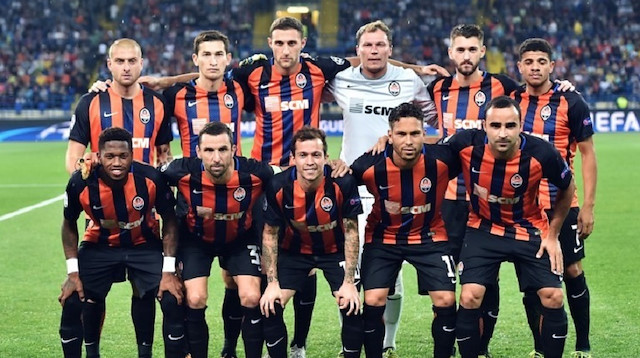
Eastern Ukraine unrest forces Shakhtar Donetsk’s departure from stadium to current temporary home of Kharkiv
Ukrainian football giants Shakhtar Donetsk have been far from home since a five-year conflict gripped eastern Ukraine in mid-2014.
Nicknamed "Hirnyky" (The Pitmen), the defending Ukrainian Premier League champions Shakhtar Donetsk have been looking for new victories away from their high-sounding home, the restive Donbass Arena in eastern Ukraine.
Shakhtar were forced to leave Donbass Arena in Donetsk once fighting broke out between Kiev and regional separatists.
First moving to Lviv in western Ukraine for security reasons, the club then relocated further east to the town of Kharkiv to be closer to their fans in Donetsk, playing their home matches at Metalist Oblast Sports Complex.
The distance between Donetsk and Kharkiv is nearly 295 kilometers (183 miles). However, Lviv is almost 1,160 kilometers (720 miles) away from the club’s native town, where armed separatists declared independence from the Ukrainian government.
Completed in 2009, the 52,667-capacity Donbass Arena is the home ground of Shakhtar Donetsk but is now closed due to the ongoing conflict.
The stadium was one of the venues for the Euro 2012 football championship, co-hosted by Poland and Ukraine.
The cost to build Donbass Arena totaled at roughly $400 million as it was officially opened in August 2009 with an event including a live concert by world-famous U.S. pop star Beyonce.
Ukraine has been wracked by conflict in its eastern regions since March 2014 after Russia’s annexation of Crimea. The fighting with separatists in the Donbass area has led to more than 10,000 deaths, according to the UN.
Shakhtar Donetsk saw the Donbass Arena hit by two blasts amid clashes between the Ukrainian army and rebels in the third month of fighting in August 2014.
The club confirmed the attack in a statement on its official website.
"There are numerous damages of the northwestern facade of the stadium, communications, equipment and detached building of the energy centre, which is located in the northern part of the Donbass Arena," Shakhtar said.
Earlier, in July 2014, six Shakhtar Donetsk players refused to return to Ukraine over unrest in the region.
Five Brazilian players -- Alex Teixeira, Fred, Dentinho, Douglas Costa, and Ismaily -- and one Argentinian, Facundo Ferreyra, have not returned to Ukraine following a friendly match against French club Olympique Lyon, club owner Rinat Akhmetov said in a statement on the club’s website.
"Players have contracts that they have to abide by. If they do not come, I think, they will be the first to suffer. Each of them has a minimum release clause, which is tens of millions of euros. If someone wants to reduce this amount by a million, then such a decision is our right. There won’t be clearance sale," Akhmetov had said in the statement, warning other football clubs not to look for a bargain purchase of the players.
Shakhtar Donetsk claimed 11 Ukrainian league titles in history, but during the tenure of Romanian manager Mircea Lucescu, the team dominated Ukraine by winning eight league titles.
Lucescu, 73, was appointed club manager in May 2004 and managed the senior team until May 2016.
In addition to their success in local campaigns, Shakhtar lifted the UEFA Cup in 2009, the club's only European trophy.
As of the 2009-2010 football season, the UEFA Cup was rebranded the UEFA Europa League, Europe's second-tier international club tournament held every season.
Lucescu is regarded as the architect and mastermind of a project putting Shakhtar Donetsk at the top of Ukrainian football and making it one of the most intimidating clubs in Europe.








